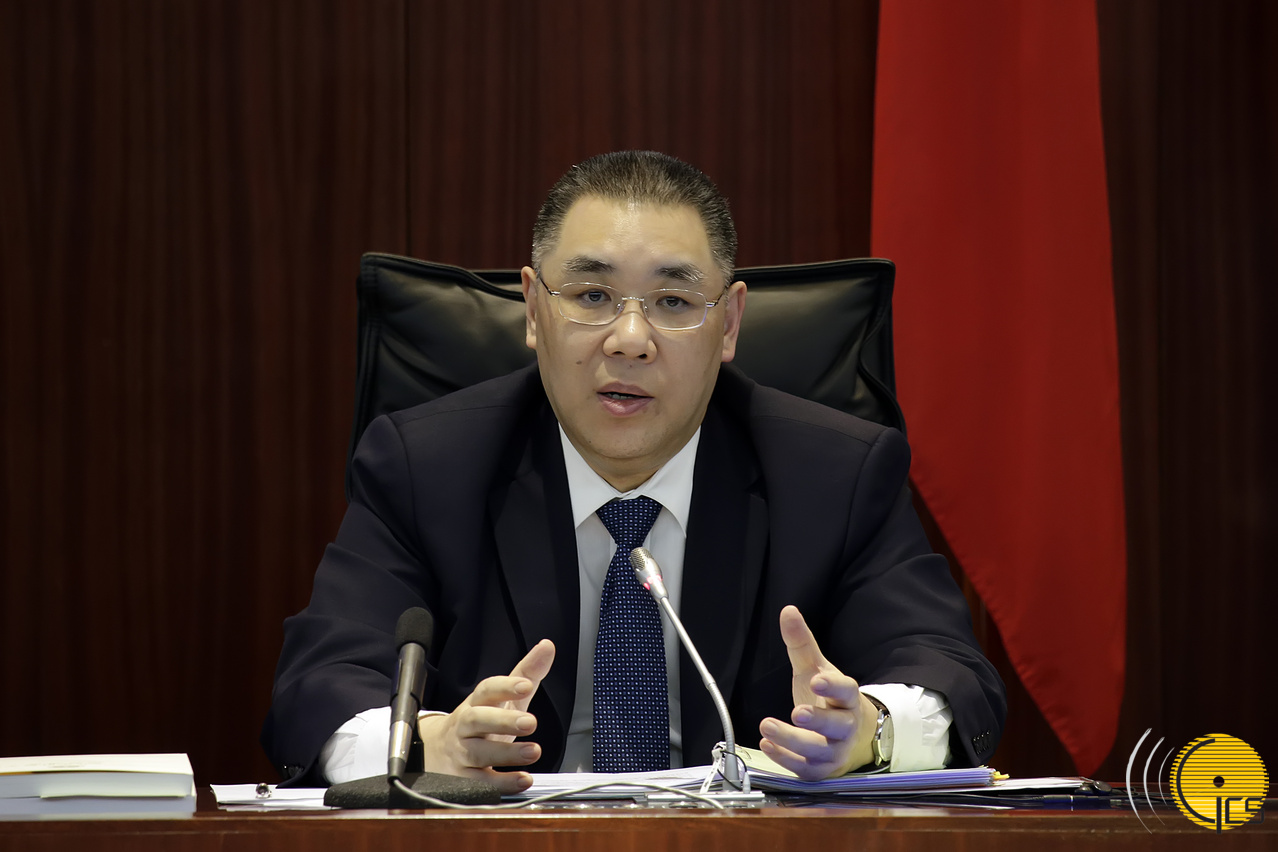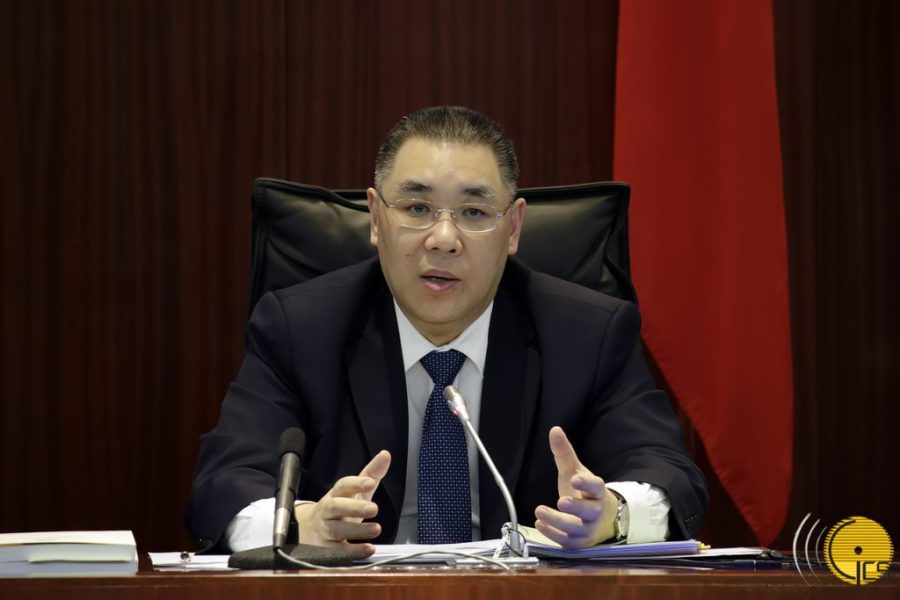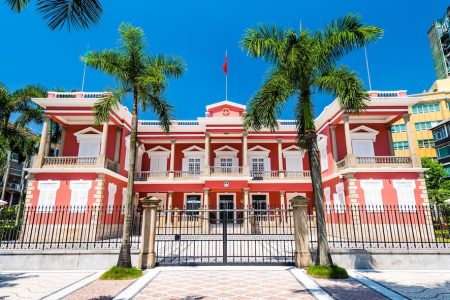Chief Executive Fernando Chui Sai On has pledged that his government will issue clear guidelines next year for allocating fiscal surpluses.
2019 is Chui’s last year of his second and constitutionally final consecutive 5-year term.
Chui made the promise during a post-policy address Q&A session in the legislature’s hemicycle on Friday
In his 2019 Policy Address – themed “Seizing Opportunities for Balanced Development” – on Thursday, Chui announced that his government would spend 18.7 billion patacas on subsidies next year, an increase of 45 percent from this year’s budget.
According to the 2019 General Integrated Budget of Public Expenditure, which amounts to 122.38 billion patacas, subsidies will account for about 15.3 percent of the government’s outlay budgeted for next year.
Chui told lawmakers on Friday that the fiscal surplus guidelines would implement a set of long-term mechanisms ensuring the effective allocation of Macau’s fiscal reserves in six main social policy areas: housing, healthcare, education, human resources development (officially termed “cultivation of local talent”), disaster prevention, and – if needed – disaster mitigation.
The government announced in its budget bill last week that it expects a general integrated budget surplus of 19 billion patacas next year.
Half a trillion patacas
In his 2019 Policy Address, Chui pointed out that the government’s financial reserves stand at about 554.9 billion patacas, or more than half a trillion patacas.
Chui told the legislature on Friday that Macau’s system of fiscal reserves was designed to withstand the sort of adverse conditions associated with uncertainly.
The chief executive said that his government had adopted a “defensive investment strategy” concerning its fiscal reserves in May by reducing in its portfolio the proportion of investment in stocks to 17 percent, from 20 percent before. He said the government would continue to focus its investment strategy on bonds with strong credit ratings and yielding high interest rates.
Chui also said that both the local and the Guangdong government were pleased with the impact of their 20 billion yuan (23 billion patacas) cooperation development fund.
GBA project
He also said the government would launch a string of infrastructure investments in the Greater Bay Area (GBA) once the central government’s GBA master plan got off the ground. He also said the government would assist local small- and medium-sized enterprises (SMEs) in investing in the Greater Bay Area, which comprises Macau, Hong Kong and nine mainland cities in the Pearl River Delta (PRD).
Concerning this year’s 11 percent increase in the government’s wealth-sharing cash handouts, from 9,000 patacas to 10,000 patacas for permanent and from 5,400 patacas to 6,000 patacas for non-permanent residents, Chui said the measure was a means for sharing the fruits of economic development with the public. He pointed out that last year’s fiscal surplus of 40 billion patacas had enabled the government to raise the amount of the handouts, the first increase since 2014.
Regarding possible GBA cooperation areas, Chui singled out innovation and entrepreneurship for young people; mutual recognition by the three GBA jurisdictions (mainland, Hong Kong, Macau) concerning professional qualifications; development of healthcare industries; and the extension of local residents’ medical welfare rights to the other two GBA jurisdictions.
Chui told the lawmakers that the recent opening of the Hong Kong-Zhuhai-Macau Bridge (HZMB) and the central government’s GBA development concept would further boost Macau’s role as a world centre of tourism and leisure, such as the launch of multi-destination travel initiatives by the tourism authorities in the 11 GBA cities.
According to the chief executive, GBA tourism cooperation has great potential.
TCM promotion
Chui also said his government would further promote the development of the Guangdong-Macau Cooperation Traditional Chinese Medicine Science and Technology Park in Hengqin, aside from the establishment of a traditional Chinese medicine (TCM) museum and the promotion of the various aspects of traditional Chinese medicine, such as in the areas of culture and innovation.
He also said the government was studying the feasibility of setting up a medical insurance scheme for Macau residents living in other GBA cities and also look into other welfare benefits that could be arranged for Macau residents living there.
Mandatory holidays
On the local labour rights front, Chui said his government was ready to listen to public opinion on its controversial proposal to amend the Labour Relations Law’s article on the enjoyment of mandatory holidays.
The government’s proposed amendment would allow employees – in agreement with their employers – to swap their mandatory holiday for a non-mandatory one concerning four mandatory holidays: Lunar New Year (3 days), Ching Ming (Tomb-Sweeping Festival), the Day After the Mid-Autumn Festival, and Chung Yeung (Double Ninth Festival).
Macau has 10 mandatory holidays, according to the Labour Relations Law.
The proposed amendment has been slammed by trade unions.
Currently, an employee working during a mandatory holiday is entitled to double pay on that day and an alternative day off within 30 days afterwards, or triple pay in lieu of an alternative day off.
Chui said the government would refer the matter to the Social Concerted Action Standing Council, which comprises labour and business sector representatives and government officials, for further discussion. He said the aim was to reach a solution taking the interests of both employees and employers into account.
Chui added that the government needed to strike the right balance between protecting workers’ rights and addressing employers’ “reasonable” expectations.
On the public transport front, Chui said that invitations to tender for the fourth Macau-Taipa bridge would be sent out by the end of the year, while construction was slated to start next year.
Chui responded to 31 lawmakers’ questions. The legislature has 33 members.
During a post-policy address press conference at Government Headquarters on Thursday, Chui said he expected his government to be able to carry out 75 percent of the objectives defined by the Macau’s first five-year plan by the end of next year. The plan runs until 2020, one year after Chui’s current term ends.






